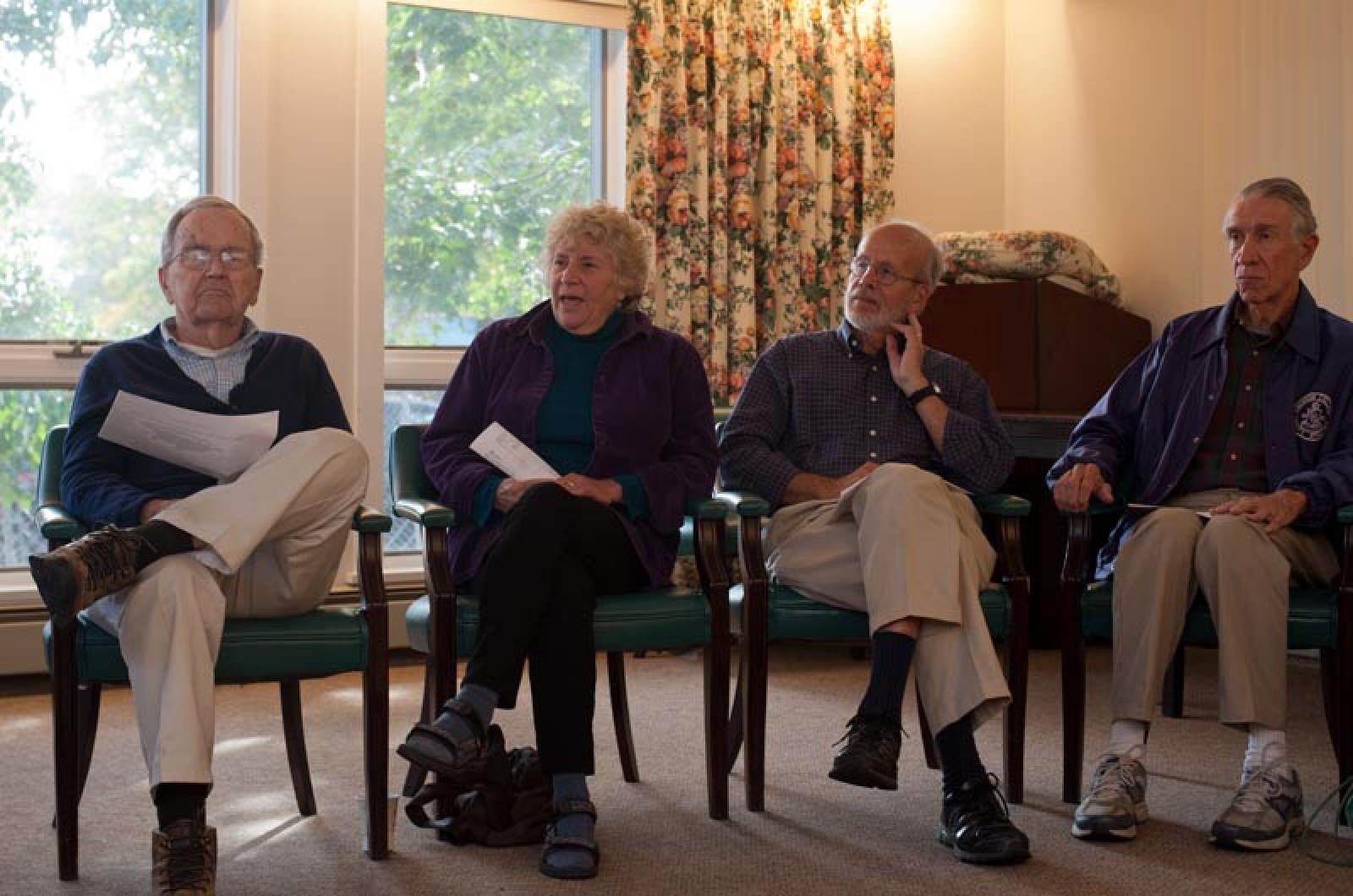It’s still where’s-my-coffee early and all is quiet at Howes House in West Tisbury. In 15 minutes though, the Council on Aging’s long-running Tuesday morning discussion group will convene.
For those who have visited parents after they retired to a condo in South Florida and sat around the pool listening to a group of seniors review the ailments of people no one knew firsthand or update the comings and goings of multiple grandchildren, expectations might not be high at the prospect of an informal discussion group for seniors.
But that was then and there and this is now and here.
Three early arrivals silently take seats next to each other and snippets of their conversation can be overheard — something about “the proliferation of chemical warfare.” Someone quotes a slip of the tongue by Latvian Prime minister Valdis Dombrovskis, and someone else mentions a report by former hostages about the methodology changes in hostage treatment in the Middle East. A comment is made about how instantaneously information can be circulated around the world. Just two men and a woman, settled next to each other, engaging in an impromptu chat. A hint of things to come.
By 9:30 a.m. most of the more than 20 chairs are filled. Men (in the majority) and women ranging in age from the 60s to the 80s, whose collective vitaes could probably get them an audience with the Pope amble in quietly. Among them are Allen Janger, David Kurn, Brigitte Lent, Peter Hawkes, Mal Jones, Helene Barr, Pamela Peia, Peter Dryer, Ike Russell, Barbara Scherlis, Nancy Evoy, Ripley Deeble, Ned Orleans, Bob Knight, and Pete Karmon. There’s an air of familiarity, although no one offers big greetings or engages in private chit-chat. The group’s volunteer facilitator, Ellen Miller, takes a seat but the discussion which has already begun, continues flowing.
A woman describes humans as herd animals and the conversations turns to tribalism.
“Define tribe,” someone says. The topic takes hold. Someone offers, “It starts with a proposition for protecting a way of life, children, putting food on the table.” Another says, “It’s cultural.”
“No, it’s tribal,” is the retort. A woman asks, “Is tribalism an expression of human nature?” and is told, “The concept of otherness is amorphous.”
The surprising caliber of the ideas and the civility with which they are being exchanged is impressive. When someone has difficulty breaking into the quick exchanges, either Ms. Miller or another member of the group gently intercedes on his or her behalf to clear the way. Egos recede and although those who speak are invested in making their points, on this morning at least, there is an easy non-judgmental atmosphere and a protocol of politeness.
There is a diversity of politics and opinion and it’s hard to resist being drawn in to the contagious exchange. There’s no risk in speaking up. The discussion is intellectual, not personal, and what begins with about five vocal participants now involves most everyone.
“Think of the Russian Revolution,” someone says, “the have’s versus the have-not’s.”
“No, I disagree,” someone objects and explains why.
At one point someone asks a man of Syrian descent to express an opinion from a Syrian perspective.
“I don’t know,” the man answers. “I’m from Brooklyn.”
Everyone laughs. But he goes on to offer some personal insights, and to explain that having a Syrian surname subjects him to being made to feel like a terrorist at security checkpoints. “We’re on one planet spinning around in the universe killing each other,” he says.
Discussion follows.
“Beliefs kill people wherever they are.”
“In other words, letting go is our salvation.”
“Letting go versus denial.”
“I feel resentment about people killing people in the name of peace.”
“What if they gave a war and nobody came?”
“That’s exactly what’s happening.”
The meeting ends at 11 a.m. and afterwards Ms. Miller, who was a classics major in college, says: “We have talked about things as diverse as the background and original purpose of the second amendment, how bonobos (pygmy chimpanzees) settle social disputes, research on mental health issues, the lack of rehabilitation in U.S. prisons, the Second Amendment, immigration and the history of various countries in the Middle East.”
She concludes: “I never know what to expect when I walk in the door . . . I do think we do have an unusual group of sophisticated and complicated people with amazing insights, and often walk out feeling that it is both a joy and a privilege to be here, and to be part of it.”
The Tuesday conversation group meets weekly, 9:30 to 11 a.m. at Howes House in West Tisbury. Participation is free and all are welcome. On Oct. 15 the topic will be hurricane and winter storm preparedness for seniors.





Comments
Comment policy »